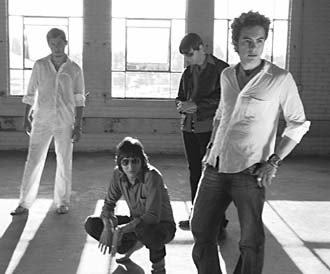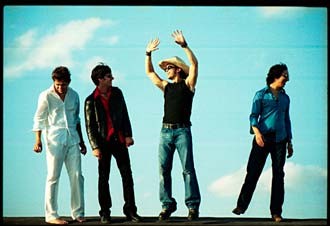The Jerry Fuentes Jr. Band's single, 'Sold Me Out,' is getting Top 40 radio play on stations like Mix 96.1, but what about the money?
Jerry Fuentes Jr. currently resides in the music industry Twilight Zone. The high rollers in recording adore Fuentes, flying the JFJ Band to New York to showcase in front of major label executives. There are appointments with music reps who come to the band's rehearsals to discuss the prospect of exclusive deals. Long-lost friends call from faraway cities, and congratulate Fuentes on his rock stardom. Their old friend, little Jerry Fuentes, is now a rock star. He has wild orgies with eager-to-please groupies, smokes nothing but Amsterdam's best, and, most importantly, is raking in the cash.
Well, not quite. Despite industry praise and radio play, Fuentes admits that the JFJ Band still has to play an occasional cover
| VH1, take note: The JFJ Band strikes an artsy pose. Clearly, they're the sensitive types. |
But Fuentes has learned to live with it. "I'm always happy when I am doing music," says Fuentes. "That's why I stuck with it." Although a record deals hover just out of reach, Fuentes is happy to craft songs, his love of music first and foremost. Even without industry
| The JFJ Band avoid the pitfalls of the typical boy-band quartet by each maintaining their own individual style: From left to right, the angelic all-in-white shoeless look, the black leather "bad boy" sass; the "hands in the air like you just don't care" cowboy-hat getup, and the slightly off-balance look of mystery. |
"I couldn't do this college jam thing anymore," says Fuentes. "I had a great time doing it, but I'm done. So then I started writing more along British rock lines." Radiohead inspired Fuentes to experiment with his musical style. He devoted his energy to songwriting - not the select covers that guaranteed a bursting tip jar. A living can be made serving frat boys, but creative growth is impossible.
The JFJ Band's recent release, The Apartment, demonstrates Fuentes' new direction. Although his earlier influences are present, the sound is in the same guitar-pop vein as Oasis. Fuentes
Kim Stephens, vice-president of A&R for Lava Records, recently visited San Antonio to hear the band. Stephens signed matchbox twenty, Collective Soul, and other national acts. After showcasing its songs, the band had a chance to pow-wow with the star-maker. "It was really cool," says Fuentes. "But what he said was real gloomy. Before labels had a vested interest, they wanted to shape a career. They don't do that anymore. They are looking for careers already made." The first question Stephens asked was how many CDs the band had sold. "The last band he `Stephens` signed sold 50,000 on their own," says Fuentes. "That's crazy to do independently. Especially the market we are in. How hard is it to get San Antonio to pay attention to music, much less to get them buy CDs? So they want statistics now. How many people do you draw to a show? How many CDs have you sold?" Today's music industry is pure economics: developing a young and talented band is no longer cost effective to major labels.
These are the days of American Idols, where fabrication has no shame. Talented artists, like Fuentes, are pushed aside, their creativity ignored while their investment potential is scrutinized. The JFJ Band is in a holding pattern, waiting for one of the major labels to step up and cultivate a deserving talent. Industry praise won't release the JFJ Band from cover-gig purgatory, and until a label shows some grace, the band will have to live with the torment. •




